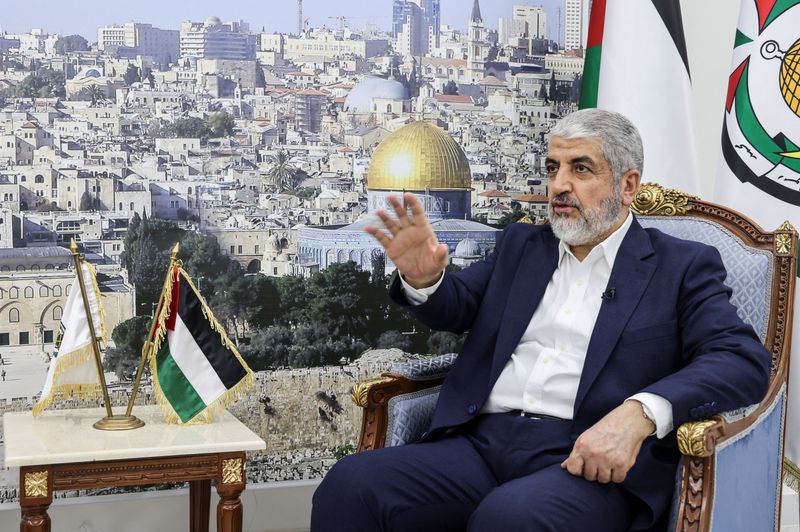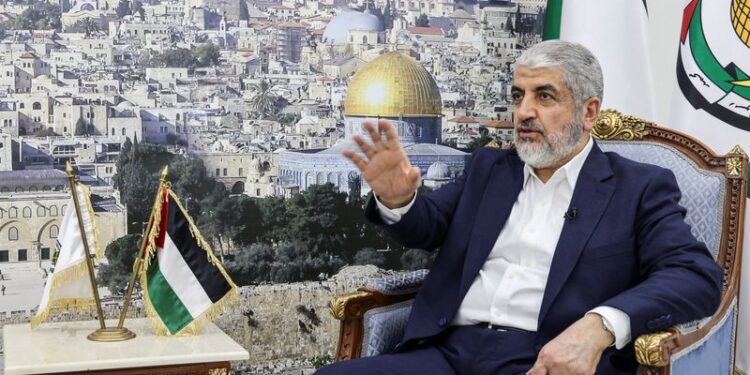By Samia Nakhoul, Ahmed Jadallah and Andrew Mills
(Reuters) – Hamas leader-in-exile Khaled Meshaal said the Palestinian group would rise “like a phoenix” from the ashes despite heavy losses during a year of war with Israel, and that it continues to recruit fighters and manufacture weapons.
One year after the Hamas attack that triggered the war, Meshaal framed the conflict with Israel as part of a broader narrative spanning 76 years, dating back to what Palestinians call the “Nakba” or “catastrophe,” when many were displaced during the 1948 war that accompanied the creation of Israel.
“Palestinian history is made of cycles,” Meshaal, 68, a senior Hamas figure under overall leader Yahya Sinwar, told Reuters in an interview.
“We go through phases where we lose martyrs (victims) and we lose part of our military capabilities, but then the Palestinian spirit rises again, like the phoenix, thanks to God.”
Meshaal, who survived an Israeli assassination attempt in 1997 after he was injected with poison and was overall Hamas leader from 1996-2017, said the Islamist militant group was still able to mount ambushes against Israeli troops.
“We lost part of our ammunition and weapons, but Hamas is still recruiting young men and continues to manufacture a significant portion of its ammunition and weapons,” said Meshaal, without providing details.
Meshaal remains influential in Hamas because he has played a crucial role in its leadership for almost three decades, and is widely seen now as its diplomatic face. He is one of six Hamas leaders indicted by the U.S. Justice Department on terrorism charges over the Oct. 7 attack on Israel that triggered the war.
His comments appear intended as a signal that the group will fight on whatever its losses, Middle East analysts said.
“Overall I would say (Hamas is) alive and kicking still and … will probably come back at some point in Gaza,” said Joost R. Hiltermann, Middle East and North Africa Program Director of the International Crisis Group.
He said Israel had not spelled out a plan for Gaza when the war ends, and this could allow Hamas to re-establish itself although perhaps not with such strength or in the same form.
Israeli Prime Minister Benjamin Netanyahu’s office declined comment on Meshaal’s remarks.
‘TICKING TIME BOMB’
Israel began its offensive against Hamas after about 1,200 people were killed and around 250 taken hostage in the Hamas attack on Oct. 7 last year, according to Israeli tallies.
Much of Gaza has been laid to waste and about 42,000 Palestinians have been killed in the offensive, according to Palestinian health officials.
Israel says Hamas no longer exists as an organised military structure and has been reduced to guerrilla tactics. At least a third of the Palestinian fatalities in Gaza, around 17,000 people, are Hamas fighters, according to Israeli officials. About 350 Israeli soldiers have been killed in combat in Gaza.

Meshaal said he saw no prospects for peace while Netanyahu’s government is in power. Israel blames Hamas, whose founding charter calls for Israel’s destruction, for the failure to secure peace.
“As long as the (Israeli) occupation exists, the region remains a ticking time bomb,” Meshaal said.







